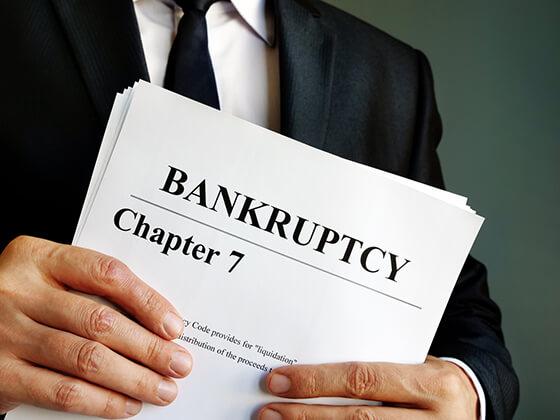(623) 777-4760

The purpose of filing any bankruptcy is to get a discharge. A discharge is a court order in which a judge determines that you have done everything you needed to do in your chapter 7 bankruptcy to have your debt forgiven.
The discharge also entitles you to certain rights meaning that any creditor in which the discharge applies will never be able to contact you in any way or attempt to collect from you for your debt. Sometimes it becomes necessary to file chapter 7 bankruptcy because of a pending lawsuit or garnishment.
Contact the best bankruptcy attorney in Glendale Az today!
Chapter 7 bankruptcy provides you with protection from creditors the moment your case is filed. This right is called the Automatic Stay or Stay. The Stay prevents any creditor from contacting you in any way including phone calls, email or text, and prevents any further negative reporting on your credit report. Additionally, any pending lawsuit or garnishment will be stopped immediately.
The Stay also applies to any pending foreclosure or repossession and most any other action a creditor may have pending against you, except criminal charges. Therefore, a Chapter 7 bankruptcy stops creditors form doing the following:
Contacting you in any way including stopping the harassing phone calls, text messages, and emails.
Once a bankruptcy is filed, a chapter 7 bankruptcy trustee will be assigned to your case. The trustee's job is to make sure that your creditors are treated as fairly as possible through the procedures of your case. The trustee will review your bankruptcy paperwork, documents you submit to the trustee and your testimony at your hearing.
You are required to attend a hearing where the trustee will question you under oath. The trustee will also review any transactions you made over the course of up to four years prior to your filing to determine if any of those transactions may have been done to hinder or delay payment to your creditors.
If the trustee finds any money or asset that can legally be taken from you, the trustee will compel you to turnover the asset. The asset will be sold or liquidated and turned into cash. The cash collected by the trustee will be distributed equally amongst your creditors.
By filing your chapter 7 bankruptcy in Arizona, you have certain rights to protect your assets from being taken by the trustee. These protections are called exemptions. You need to speak with a knowledgeable chapter 7 bankruptcy attorney before you file any chapter 7 bankruptcy to determine which exemptions apply to you and your assets.
If you have lived in Arizona for at least two full years prior to filing your case, your exemptions will be:

There are many more exemptions. Ask your attorney for help with others. If you have not lived in Arizona for two full years, contact your attorney to find out what exemptions may apply to you.
It's best to know what you may lose before you file rather than being surprised when the trustee compels you to turn over an asset you wanted to keep. In Arizona, you will likely be able to keep your home, one car per filer, your furniture and household belongings, your clothes, any firearms, wedding rings, and retirement accounts.
Assets that have no protection are anything valued higher than what the exemption affords, any tax refunds you have not yet received including the tax refund you may receive for the year after your case is filed, and any high value jewelry, collectibles, artwork, and other real estate besides your primary residence. If you have assets that you may otherwise lose in chapter 7, please review my page on chapter 13 by clicking here. In Chapter 13, you likely will not lose any assets.
After the trustee has determined if any assets need to be turned over, you will be eligible for discharge about 60 days after your hearing. The discharge will eliminate most of your debt. However, there are certain debts that are not eligible for discharge.
Those debts include some taxes, student loans, domestic support obligations like child support or spousal maintenance, government fines and any judgment where you were found to be liable for fraud. Other debts such as credit card debt, medical, personal loans, and most judgments are eligible for discharge and likely will be wiped away giving you the fresh start you desired. You would benefit from talking to a chapter 7 bankruptcy lawyer if you have a debt in question about whether it is dischargeable.
Can I keep my house in a Chapter 7 bankruptcy? Many people own a home or car and are concerned about whether they will be able to keep their property. The general premise in chapter 7 bankruptcy is that you are coming to court to claim that you have not enough income to pay all your debt and therefore, need a discharge. Having assets in a chapter 7 bankruptcy case may become tricky.
A home or car is generally considered a secured asset, which means the property (home or car) is secured as collateral by the lender. Lenders understand that people fall on hard times and file chapter 7 bankruptcy. When this happens, most lenders ask that you reaffirm the debt.
Reaffirmation means you are agreeing to continue making your monthly payments towards the debt even though you filed chapter 7 bankruptcy and are asking the court to eliminate all your debt. For most people, the home and car are debts they want to keep rather than give back.
If you want to keep the asset, it is important to understand that you must continue to pay for the asset. A lender will ask the court to remove your chapter 7 bankruptcy protection so they can foreclose or repossess the secured collateral (your car or home).
However, if you have the means to stay current on the monthly payments or very quickly become current shortly after your case is filed, then the lender will likely not want the collateral back. Most of the time, lenders want you to make the payments as you agreed to do. There are advantages to reaffirming debt, that can be explained to you by the chapter 7 bankruptcy attorney near you.

After your case is over, chapter 7 bankruptcy will remain on your credit report for ten years. You may be able to begin re-establishing credit as soon as you get your discharge. The discharge does not mean your case is over, but it is the main reason why you filed chapter 7 bankruptcy.
The court will close out your case once the trustee releases it to the court for closure. Most chapter 7 bankruptcy filers begin receiving credit card offers and solicitations for new car loans soon after their case is filed. Once you get your discharge, you may begin taking advantage of some of those offers to re-establish credit.
Credit rehabilitation, also known as credit repair, is a process designed to improve an individual's creditworthiness and overall credit profile. It involves taking steps to address and rectify negative information or errors on a person's credit report, with the goal of raising their credit score and making them more attractive to potential lenders.
Gaudiosilaw also offers a post chapter 7 bankruptcy credit rehabilitation program. If you want to take advantage of this program, it is included with the fees you pay for your case at my firm. Typically, your credit score can be rejuvenated after about eighteen months to two years, if you have taken the proper steps to grow your credit score and you have not missed any payments.
For most people, chapter 7 bankruptcy will not harm their employment or social standing. Even though chapter 7 bankruptcy is part of your public record, most people will not know you filed unless you tell them, or you are required to disclose this information.
There are many reasons why a chapter 7 bankruptcy may be in your best interest. Chapter 7 bankruptcy will protect you and most of your assets from being taken by creditors or the trustee. However, you need a knowledgeable and competent chapter 7 bankruptcy lawyer to guide you through the pitfalls of the chapter 7 bankruptcy procedures.
If you are having any thoughts about filing bankruptcy, contact the best Arizona bankruptcy attorneys today to schedule a free appointment. We can tell you if you qualify for chapter 7 bankruptcy and what we can do for you to protect you and your assets from your creditors, the trustee, and any other obstacles you may be facing by filing.
After the automatic stay is lifted in a bankruptcy case, creditors can resume collection efforts, including foreclosure, repossession, or lawsuits, against the debtor unless alternative arrangements are made, such as a reaffirmation agreement or a repayment plan.
The automatic stay provides immediate relief to debtors by halting collection actions, creditor harassment, and most legal proceedings, offering a temporary respite and allowing debtors to reorganize their finances or seek a fresh start through bankruptcy.
The automatic stay typically lasts for the duration of the bankruptcy case, which can vary depending on the chapter filed (e.g., Chapter 7 or Chapter 13) and the complexity of the case. In a Chapter 7 case, it generally lasts until the discharge is granted or the case is closed.
The automatic stay is a broad protection that halts most creditor actions upon filing bankruptcy, while the discharge injunction is a permanent court order that prohibits creditors from collecting discharged debts after the bankruptcy case is finalized, offering long-term relief to the debtor.
A proof of claim is a document filed by a creditor in a bankruptcy case, stating the amount of the debt owed and providing evidence or documentation to support the claim. It is necessary for creditors to assert their rights to receive payment from the bankruptcy estate.
Whether you can file for Chapter 7 bankruptcy and keep your house depends on various factors, including the amount of equity in your home, applicable exemptions, and your ability to continue making mortgage payments. It is recommended to consult with a bankruptcy attorney in Glendale, Arizona, to assess your specific circumstances and determine the best course of action.
I was stressed out for my own reasons, but Jim was a great lawyer and helped me accomplish what I went to him for. I recommend him if you are looking to file bankruptcy. He definitely knows what he is doing. I basically stressed for nothing.
I would highly recommend Jim to anyone. He was very easy to work with and explained everything and helped the process go smoothly. Made us feel at ease during the whole process. Also answered our question in a timely manner which was very much appreciated.
Jim and his staff were very pleasant to deal with; very helpful in a difficult time. Jim was very thorough in explaining options and made the process as painless as possible. Christina stayed on top of everything, was very helpful and professional. I would highly recommend.